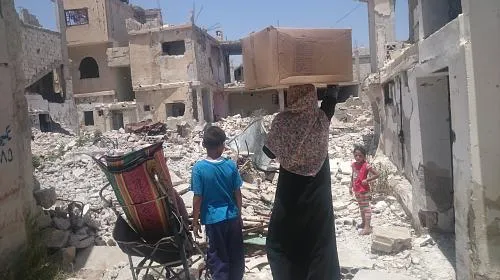DAMASCUS, Syria (Feb. 22, 2018) — A coalition of medical and humanitarian organizations, some working inside besieged eastern Ghouta outside Damascus, have urged the United Nations Security Council to vote for an immediate cessation of hostilities to allow urgent humanitarian assistance to all areas in need in Syria.
The Security Council is expected to vote today on a resolution aimed at implementing the cessation of hostilities and lifting sieges on areas like eastern Ghouta. More than 300 people have been killed there by Syrian government and allied forces since Sunday while more than 20 health facilities were subject to bombardment. The resolution would also prevent further indiscriminate attacks from armed opposition groups in Damascus, where at least 15 people have been killed since Sunday.
The coalition, which includes CARE, Save the Children and Physicians for Human Rights (PHR), is making itself heard loud and clear in New York today by deploying three billboards to circle the United Nations building, calling out the Security Council and demanding answers for the council’s inaction.
Mirroring a tactic from the Oscar-nominated film Three Billboards Outside Ebbing, Missouri, the billboards read “500,000 dead in Syria / And still no action? / How come, Security Council?”
“The situation inside Ghouta is catastrophic. So many people are dying that the numbers of the dead keep flowing into each other; we can’t keep count,” said Dr. Hamza, a physician with the Syrian American Medical Society (SAMS) in eastern Ghouta. “The amount of terror we are going through cannot be described.”
He said that families are “holed up in basements, terrified of the strafing planes and bombardment.” Because of the lack of medical attention and poor living conditions, skin diseases such as scabies are rampant and chronic diseases continue to be exacerbated.
In its joint call to the UN Security Council, the coalition calls on all members to support the passage of a humanitarian resolution and use their influence to make the cessation a reality. The coalition is asking for:
- A humanitarian pause/cessation of violence throughout Syria
- Sustained humanitarian access through weekly UN humanitarian aid convoys to all areas in need, including those in opposition-held areas
- Emergency medical evacuations with necessary safety guarantees to patients in need of urgent treatment outside of besieged areas
- Commitments from all parties to the conflict to comply with their obligations under international law to prioritize the protection of civilians and guarantee the protection of hospitals and other medical facilities
- Lifting of the sieges, most urgently on eastern Ghouta, the largest Syrian city under besiegement. Around 400,000 people have been living under siege there since 2013, leaving residents starving and many close to death.
“I just treated a woman in her twenties who spoke her last words just three hours ago,” Hamza said. “She was seven months pregnant and we couldn’t save her. There is a huge shortage of medicines and equipment to treat patients in Ghouta. None of those being killed are military target; they’re all civilians.”
The inability to deliver medical supplies prevents doctors from fulfilling their duties. Trauma drugs and surgical equipment are non-existent, and in Syria they are systematically removed from humanitarian convoys without any justification.
One of the biggest challenges doctors face is the refusal of medical evacuation requests for critically ill patients, including those with tumors and serious heart problems. In the rare cases where they can evacuate patients, many die while waiting for a medical evacuation out of Syria or treatment inside the country. Currently, more than 700 patients require medical evacuation.
The recent onslaught of violence comes on top of one of the worst hunger crises since the beginning of the Syrian conflict, with the UN reporting that 12 percent of preschoolers in eastern Ghouta are suffering from acute malnutrition.
About CARE
Founded in 1945 with the creation of the CARE Package®, CARE is a leading humanitarian organization fighting global poverty. CARE places special focus on working alongside women and girls because, equipped with the proper resources, they have the power to lift whole families and entire communities out of poverty. That’s why women and girls are at the heart of CARE’s community-based efforts to improve education and health, create economic opportunity, respond to emergencies and confront hunger. Last year CARE worked in 93 countries and reached 63 million people around the world. Learn more at care.org.
Media Contact
Nicole Harris, nharris@care.org, 404-735-0871

